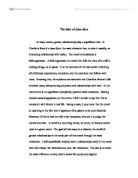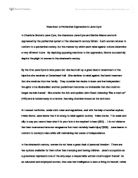The Image of the book in Jane Eyre is associated with power and possession. John Reed asserts his authority and property rights over Jane and rather surprisingly the objects he focuses on are his books:
Pursue a single image (for example hands, water, books) or a single topic (for example, religion, illness, travel) in one of the set texts, constructing a case about the text on the basis of what you know.
Books in Jane Eyre.
The Image of the book in Jane Eyre is associated with power and possession. John Reed asserts his authority and property rights over Jane and rather surprisingly the objects he focuses on are his books:
You have no business to take our books: you are a dependant, mama says; you have no money; your father left you none: Now I'll teach you to rummage my bookshelves: for they are mine; all the house belongs to me, or will do in a few years time.1
John Reed has just forced Jane away from her only means of escape: reading. It is an interesting idea: possession of the word equates with possession of power.
Jane resists such an arbitrary display of power and does so time and time again by being associated with the presence of books and as such, possession and control of language. We first see this when Jane steals a few moments to become absorbed in the written word:
With Bewick on my knee I was happy: happy at least in my way. I feared nothing but interruption, and that came too soon. (p.9)
But the Reeds deny Jane access to books and even attack her with them (p.11). The reader is aware that Jane has much to fear but lost in her fantasy world, she feels secure and in
control. Conspicuously, throughout the novel books either work "for" people or "against" them, echoing moods and acting as enemies or allies.
Jane is again threatened with a book when Mr. Brocklehurst arrives to speak with Mrs. Reed about school:
Read it with a prayer, especially that part containing "an account of the awfully sudden death of Martha G___, a naughty child addicted to falsehood and deceit." '
With these words, Mr. Brocklehurst put into my hand a thin pamphlet sewn into a cover.... (p.36)
Jane recognises the lies masquerading as a book. The pamphlet is "sewn into a cover" and aesthetically appears to be a book but Jane is not deceived by appearances: the "narrow" minded (p.32) Mr. Brocklehurst's thinly veiled threats are not fooling her: "you may give [the book] to your girl Georgiana, for it is she who tells lies and not I." (p.37) The word of God is used to elevate the words of man in order to gain ultimate control over and discipline women.
In a male dominated culture it is always a struggle for women ...
This is a preview of the whole essay
Jane recognises the lies masquerading as a book. The pamphlet is "sewn into a cover" and aesthetically appears to be a book but Jane is not deceived by appearances: the "narrow" minded (p.32) Mr. Brocklehurst's thinly veiled threats are not fooling her: "you may give [the book] to your girl Georgiana, for it is she who tells lies and not I." (p.37) The word of God is used to elevate the words of man in order to gain ultimate control over and discipline women.
In a male dominated culture it is always a struggle for women to gain access to literature and at Thornfield, Jane's access to books is improved but still limited. The "stagnation" of Thornfield weighs heavily on Jane's mind, which she clearly fears, will suffer in her role as governess:
Most of the books were locked up behind glass doors; but there was one book case left open, containing everything that could be needed in the way of elementary works, and several volumes of light literature, poetry...I suppose he had considered that these were all a governess would require for her private perusal; and
indeed they contented me amply for now...compared with the scanty pickings I had now and then in Lowood... (P.108)
The books are locked away; life, knowledge and a sense of belonging remain unattainable. Though she makes progress, Jane is disappointed in the choice of books made available to her. The "light literature" and "romances" are beneath Jane. The working classes2 read this type of fiction and since Jane considers herself to be of a higher social and intellectual standing, this is deemed to be unchallenging reading. In fact, everything about Thornfield no more than "satisfactory". The books are locked away by men and men have chosen those that are on offer.
When Jane visits her dying aunt at Gateshead, she remarks upon is how unchanged it is:
I thought I could distinguish the two volumes of Bewick's British Birds occupying their old place on the third shelf, and Gulliver's Travels and the Arabian Nights ranged just above. The inanimate objects were not changed but the living things had altered past recognition. (p.239)
Jane escapes into books rather than using them for improvement. The fictional books still "ranged just above" the reference book as they did in Jane's mind when she first began reading the fairy tales, giving more credence to the fictional works than to the non-fiction. Her fantasies of "Gulliver a most desolate wanderer in most dread and desolate regions" (p.22) seem prophetic of the position she finds herself in immediately after Rochester's marriage is revealed to her and she leaves Thornfield. She too becomes a "desolate wanderer", until she finds her family home and her equals.
The joy Jane experiences when she discovers her "Marshend" is the turning point for the image of the book in the narrative. From this moment books begin reflect the familiarity and comfort that Jane finds with her newfound family rather than the otherness and isolation she has experienced in the past. Though Jane is oblivious, the narrative gives the reader clues as to the importance of Marshfield:
I seemed intimate with every lineament...as they were each bent over a book...A stand between them supported a second candle and two great volumes to which they frequently referred; comparing then seemingly with the smaller books they held in their hands, like people consulting a dictionary to aid in the task of translation. This scene was as silent as if all the figures had been shadows, and the fire-lit apartment a picture... (p.350)
The significance of this scene is clear: here, as never before, Jane sees others "at one" with literature. Previously books had been her escape; a solitary activity she was unable to share but now she feels familiarity and an affinity with humanity. At Marshend she gains access to and control of books and a domestic equal access. Indeed when the serving woman refuses her request for help, Jane says of her despair, "Alas, this isolation - this banishment from my kind!" The family history is complete for the reader but not for Jane when Hannah tells her that the Rivers, "had liked learning, all three," (p.361) a clue for the reader that Jane has found something more than a temporary shelter. Here is an image of an educational community, of empowerment for women.
Just prior to the moment when St. John reveals the secret history of Jane's birth to her, he invites her to continue the story she had begun previously and she gains control of the word:
"I got tired of my mute books and empty rooms. Besides, since yesterday, I have experienced the excitement of a person to whom a tale has been only half told, and who is impatient to hear the sequel."
Finally she is "at home" and not only can she access books, share them with like-minded people and find a feeling of acceptance but she is also encouraged to tell her story. Events have taken full circle for Jane as she finds her position in her family and her own place in a history: a sense of belonging. Jane's happiness is complete with her marriage to Rochester. Blinded by the fire started by Bertha Mason, he is now soley reliant on Jane:
He saw nature - he saw books through me; and never did I weary of gazing for his behalf...Never did I weary of reading to him; never did I weary of conducting him where he wished to go...he loved me so truly that he knew no reluctance in profiting by my attendance: he felt I loved him so fondly that attendance was to indulge my sweetest wishes.
If the punishment for his past indiscretions3 has been cast upon him by Jane's angry double, Bertha Mason, then Jane is surely reaping the benefits: a marriage in which the woman is in control of the word.
The images of books represent Jane's varying stages of comfort and discomfort with the people around her, supporting and endorsing her emotions. She clings to books as she clings to the idea of a place and a people to whom she can belong. By the end of the
novel, Jane no longer reads to transport her away from her family but for her family and to fulfil the role for which she is needed. On the surface, Brontë constructs a narrative, which conforms to Victorian ideologies but the hidden plot expresses anger at the confinement of women within a domestic space. Jane Eyre moves away from the typical male dominated
bildungsroman and towards a feminist ideal. It is a story of the need for acceptance in a changing society, in which ones possessions are consequential to ones social standing, as the gap between the aristocracy and the middle classes lessened because of the trend towards trade and industry.
Words: 1538
Bibliography
. Best, Geoffrey, Mid-Victorian Britain 1851-75, (Fontana Press, 1985)
2. Brontë, Charlotte, Jane Eyre, (Oxford World Classics, 1998)
3. Glen,Heather, editor, Jane Eyre, New Case Book Series, (1997)
4. Gilbert, M. Sandra and Gubar, Susan, The Madwoman in the Attic, Yale University Press, 1984)
5. http:www.modcult.brown.edu/students/Segall/u-17.html
Charlotte Brontë, Jane Eyre, Oxford World Classics, p.11. All further references to this edition are given parenthetically in the text.
2 Geoffrey Best, Mid-Victorian Britain 1851-75, p.234, Fontana Press, (1985)
3 Sandra M. Gilbert and Susan Gubar, The Madwoman in the Attic, Yale University Press, (1984), p. 368
SE2208 The Victorian Novel 1847-53
Candidate 990750051
16/05/07 1 of 7







